Grown Men with Daddy Issues
On Fatherhood with Tyler, The Creator, Westside Boogie & Kendrick Lamar
“Keep that shit one hundred with you, with yourself
You don't have to put on no costume
You don't ever have to lie to kick it”
– Bonita Smith on Tyler, The Creator’s “Take Your Mask Off”
In the days since Tyler, The Creator’s new album CHROMAKOPIA dropped, many fans have compared it to Kendrick Lamar’s 2022 album Mr. Morale & The Big Steppers. Not only has Tyler expressed his love for Kendrick’s album, praising the project for its openness and honesty at a Converse All Star Series panel in 2022, Tyler also connected Kendrick’s writing approach to his own.
Talking about the song “WILSHIRE” from his 2021 album CALL ME IF YOU GET LOST, Tyler said, “It wasn’t no metaphors, I wasn’t trying to be coy about it. I told you exactly what happened for eight minutes.” He added, “We gotta cut the bullshit and be more honest, and that’s what Kendrick is doing with [Mr. Morale & The Big Steppers].”
Tyler carries this no-bullshit attitude into CHROMAKOPIA, getting real with listeners about a pregnancy scare (“Hey Jane”), his aversion to monogamy (“Darling, I”), and possibly wanting to start a family (“Tomorrow”). Tyler’s transparency and the use of a woman guide (Tyler’s mom on his album & Kendrick’s partner on his) have pointed some fans back to Mr. Morale.
But let’s not forget Westside Boogie’s 2022 album MORE BLACK SUPERHEROES, released a month after Mr. Morale, as part of the lineage of Black male rappers from the West Coast—specifically Los Angeles—exploring their fears and vulnerabilities.
Among their many similarities, all three albums—CHROMAKOPIA, Mr. Morale, and MORE BLACK SUPERHEROES—dedicate at least one song to the artist’s relationship, or lack thereof, with their father. Tyler has “Like Him” with Lola Young, Kendrick has “Father Time” featuring Sampha, and Boogie has “ANTHONY (WAR).”
Since Tyler’s career began—quite literally from the title track on his debut album Bastard—he has reckoned with his father’s absence. Tyler starts the first verse:
“This is what the devil plays before he goes to sleep
Some food for thought? This food for death, go 'head and fucking eat
My father's dead, well, I don't know, we'll never fucking meet”
While the rapper from Hawthorne, California takes shots as his father throughout the album, Tyler envisions actually shooting his dad on the album outro “Inglorious,” which references the Quentin Tarantino film Inglorious Basterds.
Five years after the release of Bastard, a 23-year-old Tyler claimed in his 2014 interview with Larry King that he wasn’t angry at his dad despite the perceived rage in his lyrics. Tyler maintained he was “stoked” not to have his father around.
“I think, if I had a dad, I would’ve went the normal college route like a lot of other people,” Tyler told King. “I just decided to rap about it to seem like I’m sad, but I’m stoked.”
And while he really may have felt nonchalant and even excited about not having his dad around, it’s hard to ignore how Tyler returns to this theme throughout his earlier records. Tyler raps on “Goblin,” the opening title track from his follow-up to Bastard:
“Yonkers dropped and left them craniums mindfucked
Now competition missing like that nigga my mom fucked
He still hasn't called me yet (that's not your fault)
But that's a whole fucking different argument, shit, I got over it”
Tyler waffles between being angry at his dad and wanting to talk to him on “Answer” from his 2013 album Wolf. He offers a precursor to his Larry King interview, expressing that his dad “not being near fuckin’ fire-started my damn career.”
Maintaining he is not being “passive” just as he did in the King interview, Tyler builds on similar sentiments a few lines later when he shares:
“I'm stoked that I didn't know you
But sucks you ain't give a fuck and considered a sperm donor now”
After 2013, Tyler touches on his dad’s absence sparingly. CHROMAKOPIA’s “Like Him” is the first time in nearly a decade where we hear Tyler talk about his dad in his music. A lot has changed since then.
His father’s last name Okonma, which Tyler expressed wanting to change on “Answer,” has become somewhat of a badge of honor for him—or at least something that he doesn’t feel a need to distance himself from.
The cover for Tyler’s 2019 album IGOR, which controversially won Best Rap Album at the GRAMMYs, includes the following disclaimer: “All songs written, produced, and arranged by Tyler Okonma.” He featured this same line on the album artwork in his Instagram post announcing CHROMAKOPIA, and it also shows up on the physical packaging for the album.
“Like Him” begins like many songs on CHROMAKOPIA with a recording of Tyler’s mother Bonita Smith speaking directly to him. Over piano keys, Smith gushes about Tyler’s resemblance to his father. Before it gets too weird, Tyler begins singing about his mom’s observations in a high-pitched voice:
“She said that I make expressions like him
My legs to my shoulders and my chin like him
My waist and my posture like him
Like him
Like him, like him, like him”
Tyler’s higher register and repetition in the chorus make it feel like we’re stepping into his shoes as a little kid:
“Mama, I'm chasin' a ghost
I don't know who he is
Mama, I'm chasin' a ghost
I don't know where he is
Mama, I'm chasin' a ghost
Do I look like him?”
It’s like Tyler is stuck in a game of hide-and-seek, and his dad is “it.” Tyler is looking everywhere only to realize he doesn’t even know who he’s looking for. He can only go off his mother’s words and whatever he sees when he looks in the mirror. Wherever his dad is, Tyler is—and vice versa.
In 2023, Westside Boogie, who grew up in Compton, California, told HuffPost a story he had never publicly shared before. During a trip to the casino, a place Boogie tries to avoid because of his father’s gambling troubles, Boogie found himself face-to-face with the man who was absent for most of his life.
“I found myself at the casino betting money I shouldn’t have even been betting,” confessed Boogie. “I look up, and my father was just staring at me.”
On his MORE BLACK SUPERHEROES outro “ANTHONY (WAR),” which references Boogie’s birth name Anthony Dixson, he explores his feelings about the man he saw at the casino—the man who abandoned Boogie when he was three or four years old.
Just like “Like Him” and “Father Time,” “ANTHONY (WAR)” begins with a woman’s voice—Boogie’s therapist. She grounds us in the subject matter, speaking directly to Boogie as if they’re in a session:
“You don't have a blueprint on how to be a father because your father wasn't around, so what is it like knowin' that you're kinda goin' through this blindly… and I wonder what your relationship with your father is now?”
This prompts Boogie’s vulnerability. And just like Tyler, he starts by unpacking his resemblance to his father. In the first verse, Boogie raps, “I barely know you so how you give me your qualities bother me, shit.” He adds:
“I really got this hate for you
I really hate for me 'cause niggas say I got my face from you”
Tyler and Boogie wrestle with not being able to escape the fact that they look like the men they’ve been able to survive without. On the second verse of “Like Him,” Tyler acknowledges, “Everything worked out without him.” But he still wonders what traits from his dad are visible within him.
We can assume that, even though Boogie hates his dad at times, he goes on to recognize it “ain’t sustainable” because hating his dad might mean hating himself—the man he resembles.
In her book The Will to Change: Men, Masculinity, and Love, bell hooks writes that boys’ longing for love and affection is “most deeply felt by boys with absent fathers.”
“Many teen boys are angry because the fantasy emotional connection between father and son, the love that they imagine will be there, is never realized,” she adds. “In its place there is just a space of empty longing. Even when it becomes evident that the fantasy won’t be fulfilled, that the ‘father wound’ will not be healed, boys hold on to the longing.”
In other words, father wounds are present even when you think you’re beyond them, whether the resemblance sits like a scar within your skin, their instructions still linger within your mind, or their absence leaves a hole that can’t be filled.
On “Father Time” from Mr. Morale & The Big Steppers, Kendrick Lamar, the Compton rapper whose dad Kenny shows up throughout his music, explores what his father taught him about being a man and how those messages have shaped him and still remain with him.
The song opens with Kendrick’s partner Whitney telling him that he really needs some therapy. Kendrick replies defensively, “Real nigga need no therapy, fuck you talkin’ about?”
In a 2022 interview on the Breakfast Club, Kendrick’s fellow Compton homie Boogie explains that he also struggled with the idea of starting therapy. He cited that, for Black men, admitting you need therapy can feel like a weakness in communities where men are told they must show strength.
Kendrick received similar instructions from his dad. On the second verse of “Father Time,” Lamar raps:
“A child that grew accustomed, jumping up when I scraped my knee
'Cause if I cried about it, he'd surely tell me not to be weak
Daddy issues, hid my emotions, never expressed myself
Men should never show feelings, being sensitive never helped”
Kendrick had to hide parts of himself to live by his father’s standard of masculinity.
“Learning to wear a mask (that word already embedded in the term ‘masculinity’) is the first lesson in patriarchal masculinity that a boy learns,” wrote hooks. “Asked to give up the true self in order to realize the patriarchal ideal, boys learn self-betrayal early and are rewarded for these acts of soul murder.”
Stated differently by
in his book Punch Me Up to the Gods, “Black boys have to be tough but, in doing so, we must also sacrifice our sensitivity, our humanity.”In other words, when we withhold ourselves from feeling and expressing our emotions, especially those such as hurt and joy, we neglect our inner child, leaving our true selves to atrophy.
As Tyler advises on the CHROMAKOPIA song “Take Your Mask Off,” “Take that mask off and tell ‘em the truth, let’s talk about it, nigga.”
That’s what Tyler admired about Kendrick on Mr. Morale: he talked about it. Boogie and Tyler both talked about it. This is major. In hooks’ words, “Many men are unable to speak their suffering.” But these Black men from Los Angeles did. They spoke up and shared their pain with the world.
In discussing their daddy issues, Tyler, Boogie, and Kendrick face themselves, how they’ve been shaped by their father’s presence or absence, and how they must show up differently now knowing what they know.
As fathers themselves, Boogie and Kendrick must consider what instructions they pass along to their own children. Kendrick is especially mindful of men like Tyler and Boogie who grew up without their fathers. At the end of “Father Time,” he raps:
“And to my partners that figured it out without a father
I salute you, may your blessings be neutral to your toddlers”
While Tyler questions whether he wants kids on CHROMAKOPIA’s “Tomorrow,” Boogie gives himself grace in parenting his son. “All I can do is put my best foot forward and make sure I’m honest with him through the whole process,” Boogie told HuffPost. “I don’t hide any of it from him because these lessons are only going to help him in the future.”
“Like Him” ends the way it begins with Tyler’s mom addressing him. But this time, it’s an apology for keeping Tyler’s father from him.
“It was my fault, not him,” says Smith. “He always wanted to be there for you, and I’m sorry. I was young. But he’s always wanted to be a father to you. So, I fucked up, and I take ownership of that, of my choices and decisions.”
Tyler’s mom asks for Tyler’s forgiveness and urges him not to hold a grudge against his father. Freedom is granted when our parents apologize and take accountability for their actions. Models of honesty and humility liberate us. So, even though Tyler’s mom believes she’s worthy of blame for the absence of his father, she gives Tyler the gift of admitting when she’s wrong.
According to hooks, “Men cannot change if there are no blueprints for change.” And Tyler’s mother gives him that blueprint. By embracing therapy and removing their masks, Boogie and Kendrick help provide that blueprint for their children.
I don’t know if I’ll ever have kids, but I can look at my own therapy journey and know that I’m better equipped to welcome a child into this world because of the blueprints for change these artists have presented in their music and the masks I’ve removed along the way.
While I grew up with my dad in my life, I didn’t grow up with my dad in my house. I craved father figures, naturally looking to the athletes and musicians I saw on TV. The behaviors they modeled were imperfect and, at worst, harmful. But figures like Allen Iverson and 50 Cent helped teach me how to be a man.
As my dad and I have learned how to grow older with each other, he’s always hoped that I’m able to learn from his successes and mistakes. Years of therapy have shown me that my parents have passed along imperfect instructions because they’ve been handed imperfect instructions.
While I’ve been angry with my parents at different points, I understand that a blueprint doesn’t always mean the building won’t have problems. And even though there have been times where my parents have hurt more than they helped, I trust that the foundation is rooted in love and wanting what’s best for me.
As we grow and mature, I can only hope that we take accountability for our mistakes, learn from them, and do better by ourselves and our people. It starts with taking that mask off and telling each other the truth.
Let’s talk about it.

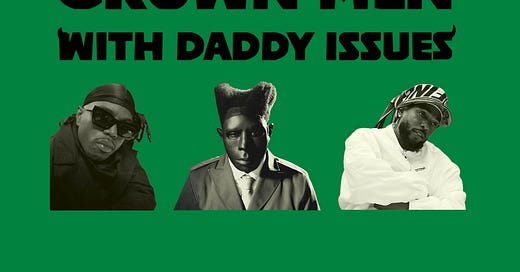





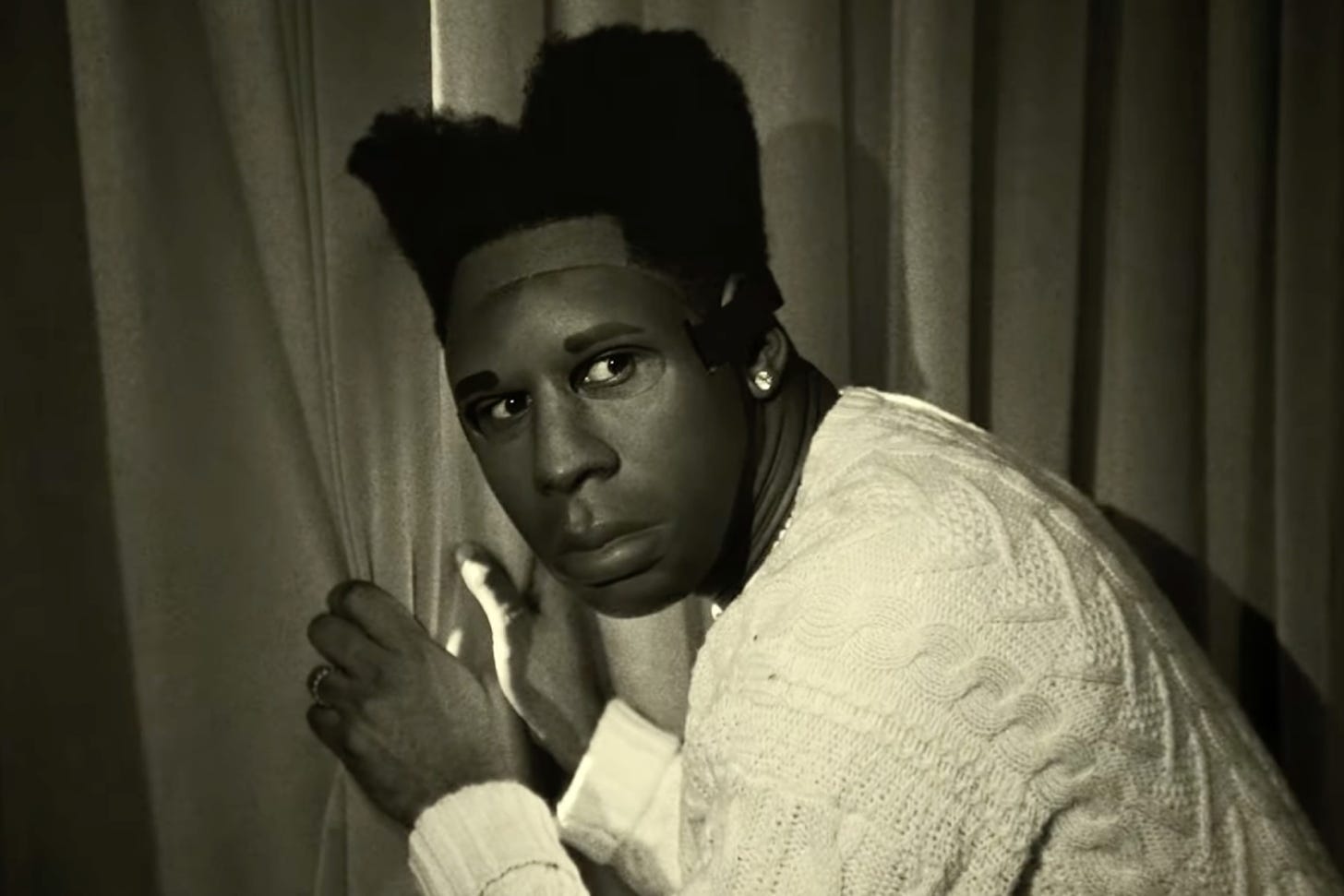

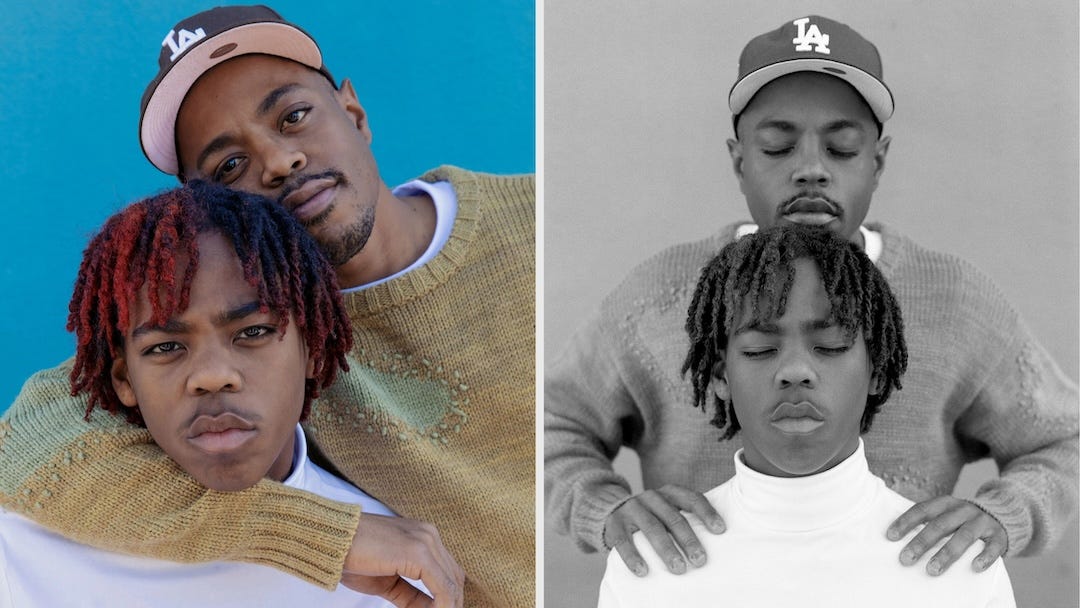

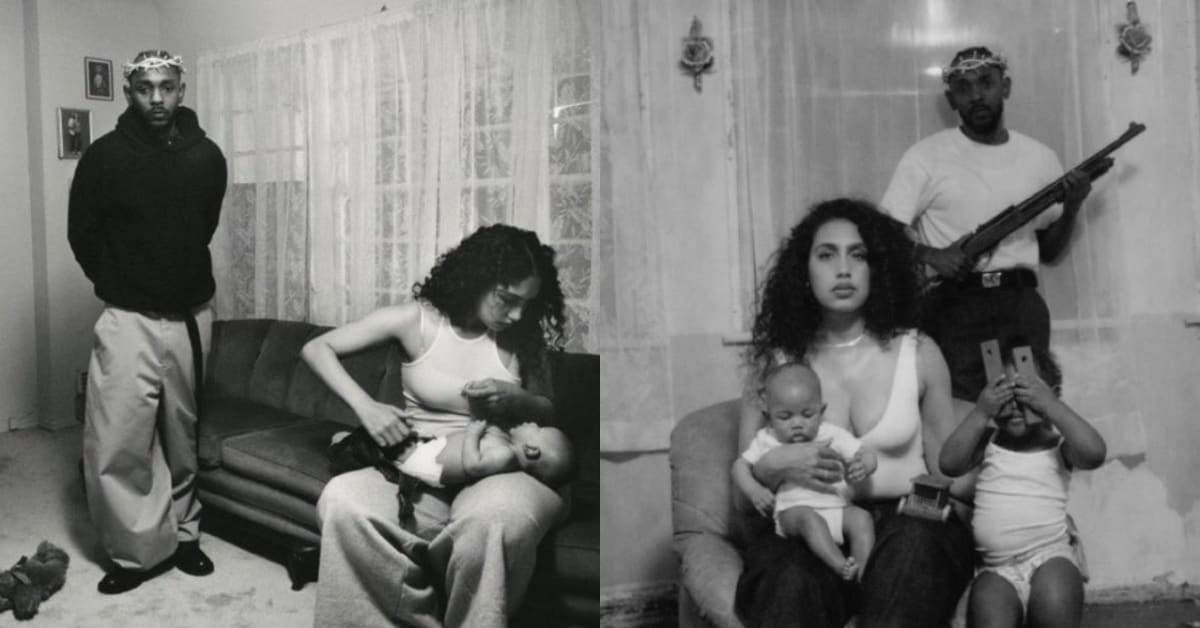

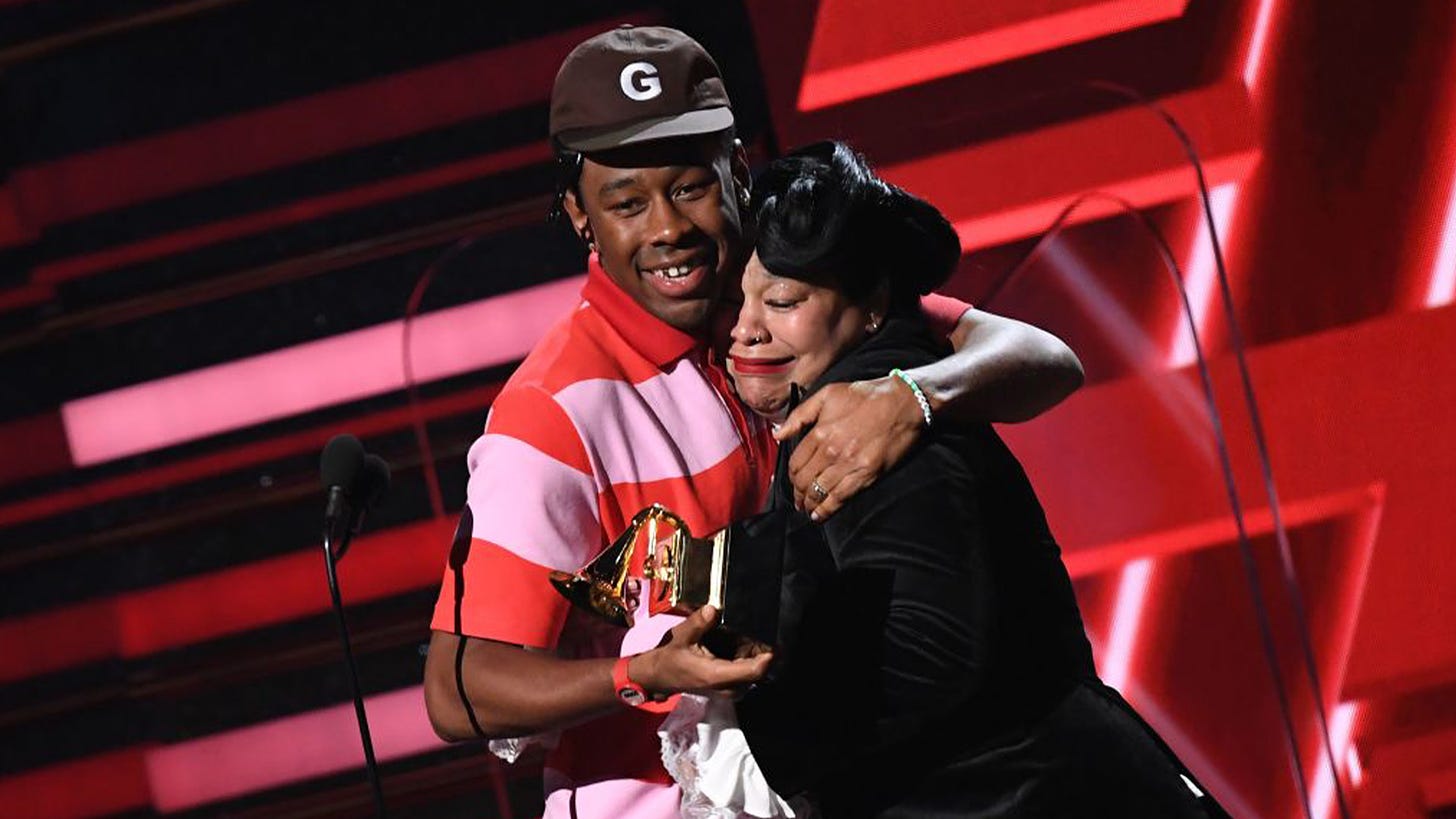
This is such a great read. My father didn't have his father so I saw first hand what that does to a man and how much extra work and healing it requires to grow. I'm happy public figures like Tyler and Kendrick are addressing it through their music and publicly as a whole our boys understand that it's okay to wonder but also understand it's a healing process.
Alex I listened to this without my snacks, on an empty stomach at 6am, but I digested this like a whole meal.
This triggers the fuck out of me but from a male perspective I get it. Respected.
I'm thinking of my father and our talks. Listening to his stories of his childhood was difficult. I would be halfway through my 30s when he finally takes off his mask to me. I see a man that is still angry with his mother and growing up without his father active in his life. The poor black boy from Columbus, MS that grew up too soon and witnessed too much. He dreamed of the ideal family he always wanted as a kid and wasn't able to achieve that as an adult.
How can he be a good father to me if he mirrors the same behavior of his father? He tried but he doesn't get father of the year. I parted ways from him because our relationship became too complicated. But I still love him though. I turned out ok.
Thank you so much for sharing your thoughts. This was great to listen to.🤎